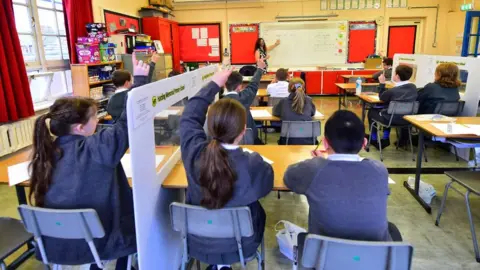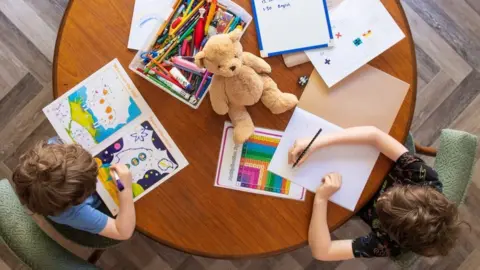Covid-19: Teachers advised to avoid 'catch-up narrative'
 Pacemaker
PacemakerTeachers should avoid using terms like "catch up" or "missed work" when children return to schools, according to Department of Education guidance.
It has been issued ahead of some pupils returning to classrooms next month.
"The 'catch-up' narrative can place unnecessary pressure and anxiety on children," it states.
"Language is important and frequent references to 'missed work' or 'lost time' or 'catch up' will potentially increase pupil anxiety."
Schools have also been asked to enable pupils to have "recovery conversations" about their experiences of the coronavirus pandemic.
"Children will want space to talk about their Covid-19 related experiences and ideas but they also will need time to think about other things and get away from the dominance of the Covid-19 outbreak," the guidance said.
Pupils in primaries one to three and those in pre-school are due to be the first to fully return to class on 8 March.
They will be followed by pupils in years 12-14 on 22 March but pupils in other years do not yet know when they will return to school.
'Unnecessary pressure and anxiety'
The department has sent guidance to primary schools on the curriculum.
It said that the long-term effect of the "current unprecedented disruption on learning is difficult to estimate".
"The department appreciates that children will have had very different home experiences during the period of remote learning.
"We equally recognise that the 'catch-up' narrative can place unnecessary pressure and anxiety on children."
The guidance said schools needed to support children to "reconnect socially, build positive relationships and engage enthusiastically with learning".
"The vision is for a balanced day where children are able to play, are ready to learn and feel able to re-connect."
 PA Media
PA MediaThe guidance added that schools could adapt the curriculum to meet the needs and interests of pupils as they returned to class.
"Whilst it is important not to underestimate the task facing schools, evidence indicates that missed knowledge content in itself is not likely to be a long-term problem for pupils," the document said.
Initially schools are to focus on getting pupils used to routine, interacting with others and sustaining concentration again.
"One of most significant consequences of remote learning for children is the lack of social development that comes with being part of the school community," it said.
"Positive relationships are vital for child development.
"Children may have experienced variety of loss during the pandemic, including the loss of relationships with their peers.
"Many relationships that were thriving, may need to be invested in and restored."
The department also said that physical education (PE) and outdoor play should have a "central role" for pupils as many children had reduced physical activity when out of school.
"The department recommends that schools should provide children and young people with at least two hours of curricular PE each week and this recommendation has never been more important," the guidance said.
Separate advice on the practical and logistical arrangements for the reopening of schools would be provided at a future date, said the department.
The interim mental health champion Prof Siobhan O'Neill has also previously warned of the negative effect of the pandemic on the wellbeing of children and young people
